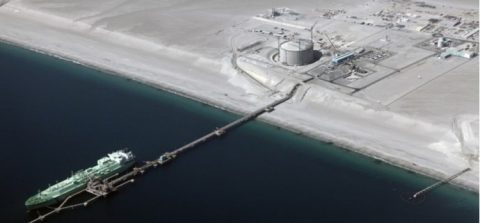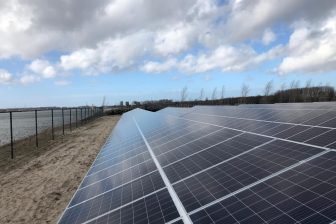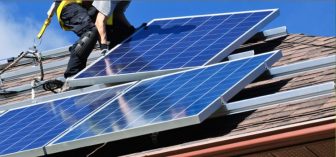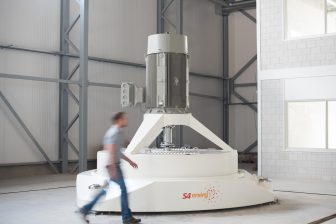
Energiezekerheid EU – Europa zet in op LNG en gasopslag
17 februari 2016 – Om de energiezekerheid in Europa te vergroten, wil de Europese Commissie dat gas uit verschillende bronnen, landen en routes wordt geïmporteerd. De EU wil verbetering van de mondiale LNG-infrastructuur. Daarnaast zet de EU in op gasopslag.
De Europese Commissie kwam dinsdag met een ‘sustainable energy security package’ dat de energiezekerheid in de EU moet verbeteren. Een van de maatregelen is verbeteren van de LNG-infrastructuur.
Uit een bericht van de NOS
‘(…) Een belangrijk thema is het vloeibaargasnetwerk (LNG). Europa is een grote importeur van LNG, maar de brandstof bereikt niet alle gebieden even goed. Dat kan met een betere infrastructuur efficiënter. (…)’
LNG is aardgas dat onder druk vloeibaar wordt gemaakt, waardoor het 600 maal minder volume heeft dan aardgas. Dit maakt het mogelijk om LNG over lange afstanden te vervoeren zonder leiding, bijvoorbeeld in schepen. Gas kan dan in de hele wereld worden ingekocht.
Nu voert de EU nog relatief weinig LNG in.
Uit een bericht van de Europese Commissie
‘(…) Less than half of the EU’s gas needs are currently met by domestic production. The rest is imported, mainly from Norway (30%), Russia (39%) and Algeria (13%). In recent years LNG has accounted for around 10% of imports, with most of that coming from Qatar, Algeria and Nigeria. (…)’
Maar dat kan anders, aldus de Europese Commissie.
‘(…) In order to improve the access of all Member States to LNG and storage as an alternative source of gas, the EU needs to:
- build the necessary infrastructure to complete the internal market, allowing all Member States to access international LNG markets, either directly or via other Member States. While in the North-West of Europe markets are competitive and well-connected, with access to several sources of gas – including a number of terminals with substantial capacity to import LNG – gas markets in the Baltic, central-eastern, south-eastern and south-western regions are less developed
- complete the internal gas market so that it sends the right price signals — to attract LNG to where it is needed and to facilitate necessary infrastructure investments;
- use storage facilities more efficiently. The Commission will improve the operational rules on the cross-border use of storage. It is also important that Member States optimise the use of gas storage across borders by creating regional preventive action and emergency plans.
- work closely with international partners, to promote free, liquid and transparent global LNG markets. This means engaging with current and future suppliers and with other major consuming countries to ensure that LNG can be traded freely on global markets, both under normal market conditions and in the event of external shocks. (…)’
Verder wil de EU meer faciliteiten voor het opslaan van gas, dáár waar het nodig is.
‘(…) Storage capacity in the EU is unevenly distributed with large facilities in Italy, France, Germany and the Netherlands. For geological reasons, East and South-East Europe can only use small storage capacities to ensure a continuous gas supply. When well connected by pipelines Member States can benefit from stored gas in neighbouring countries. (…)’
Meteen nadat de Europese Commissie de plannen bekend maakte, reageerden milieugroeperingen bezorgd.
Jiri Jerabek van Greenpeace EU in de Guardian
‘(…) “It’s like the Paris agreement never happened, and the commission is stuck on gas, dishing out a costly proposal that will keep Europe hooked on energy imports. Only if Europe focuses on renewables and energy efficiency will Europe meet its climate targets and reduce dependence on foreign supplies.” (…)’
Uit een bericht van EurActiv
‘(…) Antoine Simon, of Friends of the Earth Europe, said that the gas package had given the US the “green light” to export fracked gas to the EU. (…)’
En dat is slecht nieuws, vindt Friends of the Earth, want bij fracken komt veel methaan vrij, wat weer slecht is voor het klimaat.
Bronnen
Europese Commissie, 16 februari 2016: Liquefied Natural Gas and gas storage will boost EU’s energy security
The Guardian, 16 februari 2016 : Europe places bets on natural gas to secure energy future
EurActiv, 17 februari 2016: Commission gives ‘green light’ to fracked gas imports
Foto: LNG-haven in Mejillones, Chili (GNL Mejillones)



